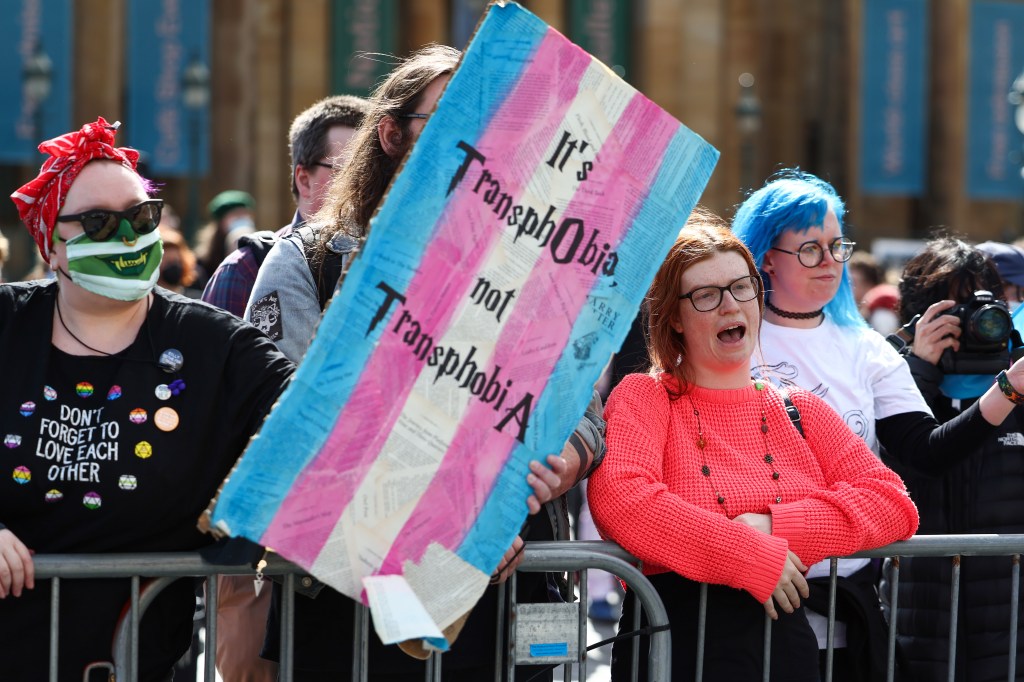Supreme Court to hear case on the definition of a woman

Supreme Court to hear case on what the definition of a woman is (Jeff J Mitchell/Getty Images)
Judges on the UK’s Supreme Court will decide the legal definition of a woman, in a landmark case which could have wide-ranging implications for transgender and non-binary people.
The case has been brought by gender-critical group For Women Scotland (FWS) against the Scottish government and will ask five justices – Lord Reed, Lord Hodge, Lord Lloyd-Jones, Lady Rose and Lady Simler – to consider: “Is a person with a full Gender Recognition Certificate (GRC) which recognises that their gender is female, a ‘woman’ for the purposes of the 2010 Equality Act?”
In essence, the judges have to decree if the protected category of sex is based solely on the reproductive organs and chromosomes with which a person is born, or something that can change based on gender identity and the gender-recognition process.
FWS, who have been publicly supported by author JK Rowling, describes itself as a “grassroots women’s group” founded at a time of “growing unease about how women’s rights would be affected by the Scottish government’s plans to reform the Gender Recognition Act (GRA), to allow for self-declaration of sex”.
Barrister Aidan O’Neill, who is representing the group, argued that considering a person with a GRC a woman was “legal fiction” and that sex was an “immutable biological state”.
Ahead of the case being heard, FWS member Susan Smith said: “If the Supreme Court sides with us, that’s fine. If they don’t, it’s a headache for Westminster. If we lose, it means that sex in the Equality Act isn’t really definable. It’s meaningless, essentially.”
Following a two-day hearing in London, the final ruling – not expected until next year – could have a major impact on the ways in which equality legislation can be interpreted and will affect how public bodies and organisations operate, particularly with regard to issues such as single-sex spaces.
The case is a direct challenge to judge Lady Haldane’s ruling in December 2022 that sex is “not limited” to biological sex and the ability of a GRC to change a person’s legal sex “does not offend against, or give rise to any conflict with, legislation where it is clear that ‘sex’ means biological sex”.
That ruling came after a contracted legal battle which pitted women and trans rights against each other through various courts.

In 2018, the Scottish government passed the Gender Representation on Public Boards (Scotland) Act, which aimed to increase the number of women represented on public boards in the devolved nation.
An amendment to the bill sought to alter the definition of women to included trans women, with and without GRCs, something FWS challenged as setting a “dangerous precedent” that, they said, would “erode women’s rights in law”.
While the group lost the initial challenge, a series of appeals went their way. However, while dropping the definition from the legislation, the Scottish government issued guidance for how it should be interpreted, saying the category of “women” was defined by the Equality Act and the GRA, meaning a person with a full GRC should be considered female “for all purposes”.
FWS challenged that guidance but lost. Lady Haldane then ruled that trans women with a GRC could be legally defined as women, a decision which left the campaign group “hugely disappointed”.
They issued a statement, saying: “This seems disastrous for women who are seemingly now no longer recognised in law as a sex-class, with distinct requirements of our own. We are analysing the decision and will consider if any further legal action is appropriate in due course.”
The group appealed against the ruling but it was upheld last year, when lord justice clerk Lady Dorrian said transgender women who had a GRC “possess the protected characteristic of sex according to the terms of their GRC”.
She went on to say: “Individuals without a GRC, whether they have the protected characteristic of gender reassignment or not, retain the sex in which they were born and [no] conflation of the protected characteristics is involved.
“A person with a GRC in the female gender comes within the definition of ‘woman’ for the purposes of section 11 [sex] of the Equality Act, and the guidance issued in respect of the 2018 act is lawful.”
How did this story make you feel?

